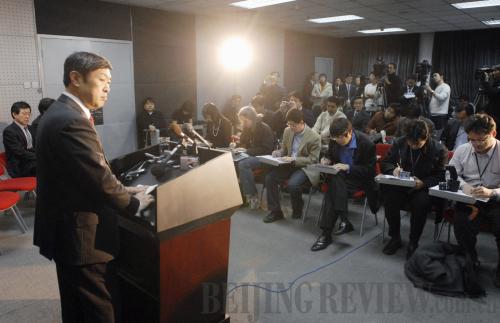|
 |
|
EYES ON THE FUTURE: Shinichi Kitaoka, a professor at the University of Tokyo and head of the Japanese team in the China-Japan joint history research program speaks at a press conference at the Japanese Embassy in Beijing in December 2006 after the first panel meeting of the program (CFP) |
Chinese and Japanese scholars have recently re-acknowledged that Japan had been the aggressor when it launched war against China more than seven decades ago—a consensus analysts say could do plenty to help advance the East Asian integration process.
In December 2009, after three years, historians in a joint China-Japan history research initiative concluded the first phase of their studies.
Under an agreement between top leaders in Beijing and Tokyo, the project aims to enhance understandings of important earlier events in East Asia, while smoothing over the sharp disputes over historical issues—in particular, wartime history.
"Both Chinese and Japanese scholars," said Bu Ping, head of the Chinese team, "have made it clear in their papers that the war fought between China and Japan from 1931 to 1945 was an aggressive war Japan waged against China."
In a December 26 press conference in Beijing, Bu, who is also Director of the Institute of Modern History at the Chinese Academy of Social Sciences, said Chinese scholars pointed to the huge damage Japanese troops inflicted on the Chinese nation in their research papers, while "expressing the wish to condemn aggressive wars and safeguard peace."
Their Japanese counterparts, likewise, acknowledged Japanese aggression against China as well as the "tremendous harm" Japanese invaders caused to the Chinese people, he said. At the same time, they noted, atrocities by Japanese soldiers led to mass civilian deaths, something that continues to haunt Sino-Japanese relations.
Evidence of these considerable repercussions, according to Bu, were spelled out in research by his Japanese colleagues, who noted recent legal actions against Japan for its germ warfare program, residual pollution from abandoned chemical weapons, the exploitation of Chinese laborers and sexual crimes against Chinese women, among other wartime atrocities.
The Chinese and Japanese research teams, each consisting of 10 scholars, have completed 26 papers on 13 topics. In separate papers, each topic is addressed by a Chinese scholar and a Japanese scholar.
Before finalizing their papers, the scholars peer-reviewed the works of their counterparts who, in turn, made changes they deemed necessary. The papers—covering not only the recent history of relations between the two East Asian neighbors, but also that dating back 2,000 years—will soon be made available to the public.
The road ahead
By conducting joint history research, China does not seek to in any way avenge Japan's past aggression, said Tao Wenzhao, a participant in the program and a research fellow at the Chinese Academy of Social Sciences.
Instead, he noted, China wants Japanese politicians and scholars to recognize a consistent, correct perception of Japan's participation in World War II—so never again will wartime history hinder the progress between Sino-Japanese relations.
This has proven a particularly thorny problem in very recent times.
On no less than six occasions, for example, former Japanese Prime Minister Junichiro Koizumi visited the Yasukuni Shrine, a notorious religious site that honors Japanese military aggressors. His visits, between 2001 and 2006 while in office, in turn, initiated a chill in Japan's political relations with its Asian neighbors.
Indeed more than a few conservative Japanese scholars have made persistent efforts to whitewash the conduct of the Imperial Army, for example, by redefining the invasion of its neighbors as "self-defense."
Such scholars have also characterized the fighting and the atrocities that accompanied it as "a war of national liberation in Asia." Further published articles have denied the use of biochemical weapons, forced labor and the Nanjing Massacre, which claimed 300,000 Chinese lives, according to China's official estimate.
Nevertheless, more than 70 percent of the Japanese public believes their leaders led a brutal war of aggression in the 1930s and 1940s, Tao said.
"Since the very beginning of the joint research," Tao said, "we have underlined the importance of mainstream public opinion."
In fact, in the Sino-Japanese Joint Statement issued in 1972 to normalize bilateral ties, Tokyo announced it was "keenly conscious of the responsibility of the serious damage that Japan caused in the past to the Chinese people through war, and deeply reproaches itself."
This position was reiterated in the Sino-Japanese Treaty of Peace and Friendship in 1978, and in the Sino-Japanese Joint Declaration in 1998. These sentiments were further echoed by Japanese Emperor Akihito upon his visit to China in 1992.
And on the occasion of the 50th anniversary of the end of World War II on August 5, 1995, then Japanese Prime Minister Tomiichi Murayama issued a climactic apology—shedding any doubts about the Japanese Government's view of its wartime history.
Since the beginning of the 21st century, Sino-Japanese relations have moved into a critical period, given the dramatic changes in East Asia and in the world at large, Bu said.
China's emergence as a global power, he added, only underscores the need for a fuller understanding between the two sides—thus easing the transitions of an ever-changing international landscape.
| 